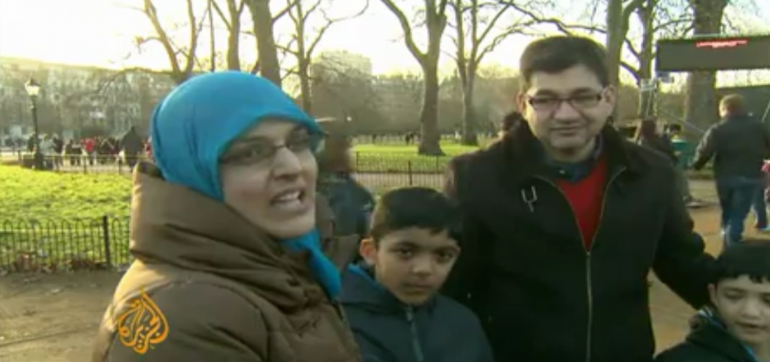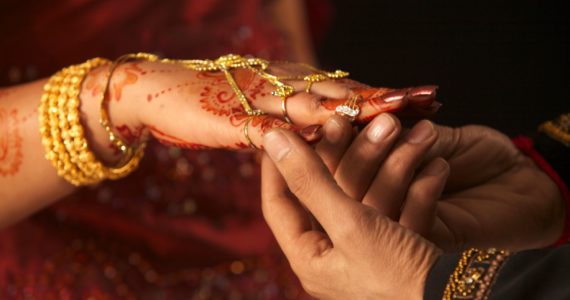Source: http://www.aljazeera.com/indepth/features/2012/12/2012122795639455824.html
Rudabah Abbass is a freelance writer and producer based in Doha and London. Prior to joining Al Jazeera English, she was a producer for Channel 4 News and CNN. She has also worked on documentaries for ITN. Her work focuses on arts and cultural issues and she has contributed articles to arts magazines in the Far East. Educated at Royal Holloway University of London and City University, she holds degrees in Media Arts and TV Current Affairs Journalism.
Islam is the United Kingdom’s fastest-growing religion, and the country’s Muslim population has nearly doubled in the past decade.
As the number of British Muslims increases, some are deviating from the faith’s traditional norms. Many Muslim women in the UK now walk a tightrope between their Islamic culture and British identity.
Britain’s diversity has spawned financially independent Muslim women who appear to be challenging their cultural and religious boundaries.
Being raised in a country that promotes tolerance and acceptance of others, they do not see themselves any ‘different’ to their non-Muslim compatriots. Increasing numbers are rejecting some of the cultural norms on offer, such as arranged marriages and family introductions. Instead seeking partners for themselves, who are an intellectual, financial and social equal.
Radically, challenging their boundaries has meant that growing numbers are choosing to marry out their faith.
In the UK, 21,000 interfaith marriages were recorded in 2001. Although no new statistics on the issue have been released since then, imams in the UK told Al Jazeera that these figures have surged in recent years.
Sheikh Toufik Kacimi, the CEO of Muslim Welfare House, a charity and community centre in London, says he is approached by at least two couples per week to consult on interfaith relationships.
Most religious scholars agree that Islam permits Muslim men to marry “women of the book” – Christians or Jews – thus expanding the number of potential partners to choose from.
Muslim women, on the other hand, are forbidden to marry a non-Muslim unless her partner converts to Islam, say purists. Some men nominally convert to Islam in order to appease their partner’s family.
Imam Taj Hargey of the Muslim Educational Centre of Oxford is an exception. He has conducted marriage services for Muslim women without their Christian or Jewish partners converting. Most Muslims find this notion unacceptable, claiming it is tantamount to living in sin.
Imam Hargey’s stance may be controversial, but he argues: “There is no verse in the Holy Quran that bans Muslim women from marrying non-Muslim men.”
“Almighty God would have revealed explicit directives if Muslim women were not allowed to marry outside the faith,” he says. “As Muslim men are entitled to marry women from the People of the Book who are not Muslim [Surah al-Maidah 5:5], the same right must be afforded to Muslim women as Islam is a gender-equal religion.”
While imam Hargey may be alone in his outlook, some traditionalists are adapting to the reality that interfaith marriages are becoming more common.
In a new initiative by the interfaith organisation Christian Muslim Forum, senior Muslim imams and Christian ministers have recognised the rise in such marriages. After consulting with hundreds of couples, they have listed a series of guidelines calling for a softer approach to interfaith marriage.
Although stopping short of endorsing interfaith marriage, the religious figures of the Christian Muslim Forum, have encouraged counseling for such couples and oppose forced conversion as a condition for marriage.
Julian Bond, the director of the Forum, says unsympathetic behaviour towards interfaith couples can often turn people away from religion instead of helping them to remain within it.
Ostracism and shame
For 22 years, Mandy Sanghera has worked with women who have married out of their faith, and counseled their family members. Like Bond, she says transgressing women rejected by their families often withdraw from their faith, as they are unable to enter a mosque or interact with the community.
Interfaith relationships have at times led to ostracism and violence against the couples, sometimes even resulting in forced marriages and honour killings. According to the UK constabulary, 2,823 honour crimes were reported to the police in 2010 and an estimated 10,000 forced marriages take place in Britain every year.
Many women in interfaith relationships, says Sanghera, have been disowned by their families, who in turn are often shamed with hate mail, threats and assault. “They never overcome the shame element of what their neighbours and the community will think,” says Sanghera. “And their daughters become part of a witch-hunt, always looking over their shoulders for the rest of their lives.”
Heather Al Yousuf is a Christian married to a Shia Muslim. In the late 1990s she decided to launch the Interfaith Marriage Network, a support group for Muslim-Christian couples.
She is approached by an average of 100 couples per year. Initially the couples were mostly Muslim men and non–Muslim women, but now about half are Muslim women with non-Muslim partners. Similar groups are also underway in Germany, France and Austria, Al Yousuf says.
Converging, not converting
“We hear over and again: ‘I’ve met this non-Muslim guy at university or work who I feel compatible with and he’s not going to stop me from practising my religion’,” says Al Yousuf. “None have told me: ‘I’m giving up my faith,’ because they do not feel their identity would be under threat by marrying a non-Muslim.”
Al Yousuf, when asked what the ideal model for an interfaith relationship should be, responded that the “couple should be converging rather than converting”.
Salma and Pim, who did not want their last names used, are such a couple. She is a British Muslim and he is a Dutch Christian. Their marriage ceremony was performed by imam Hargey.
“When I started falling in love with Salma, who I knew was Muslim, I realised that me being Christian was a potential conflict,” Pim told Al Jazeera. But he was not willing to undergo a sham conversion to Islam, due to what he describes as his “respect for Salma as a person and her religion”.
Salma, a practising Muslim, said the couple encountered difficulties when they decided to tell their families about their relationship: “I felt really sad that they were too upset and depressed to talk to me openly. There was so much happiness in my heart for being in love. I wanted them to come with me on this journey.”
When imam Hargey married them, he provided the comfort that Salma could still carry on being a believing Muslim. “It meant a lot to me,” she says. “It’s made me closer to God and has taken that inner conflict away.”
Supporters of interfaith marriages, say couples like Salma and Pim have ventured into a progressive new model.
Meanwhile, it remains to be seen whether the Christian Muslim Forum’s guidelines will ease the burden of interfaith relationships.
For some couples, the conflict whittles down to a difference of opinion versus a difference of belief, without compromising a spiritually nourishing life.
Interfaith couples are likely to take inspiration from the psychoanalyst Erich Fromm who said that: “Love is an act of faith, and whoever is of little faith is also of little love.”








